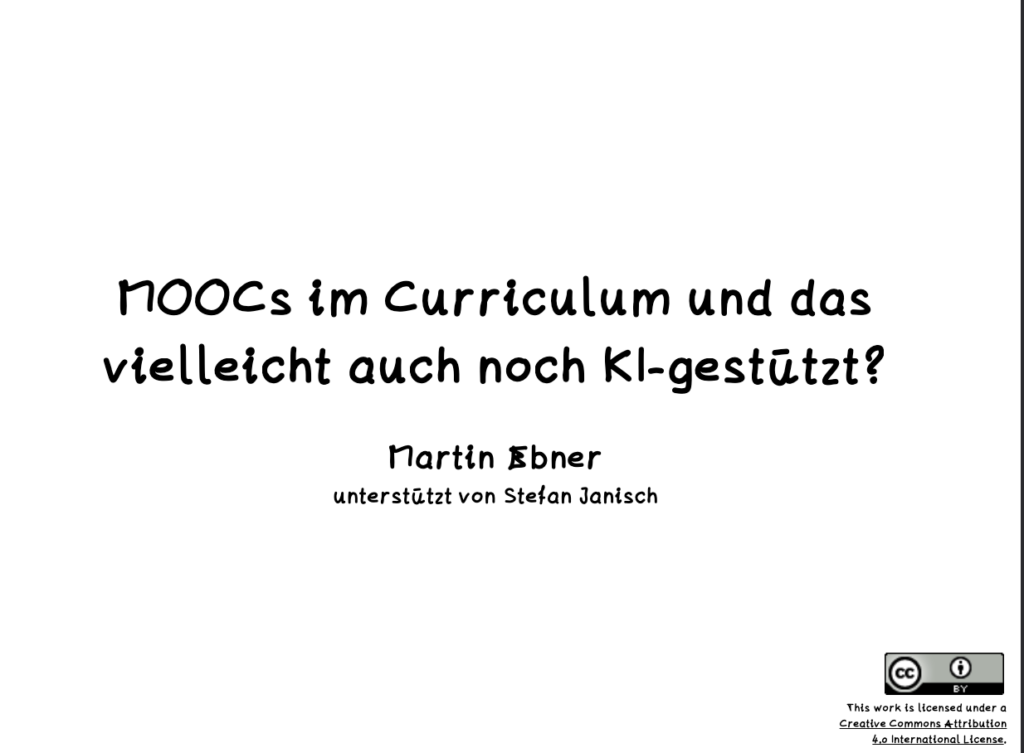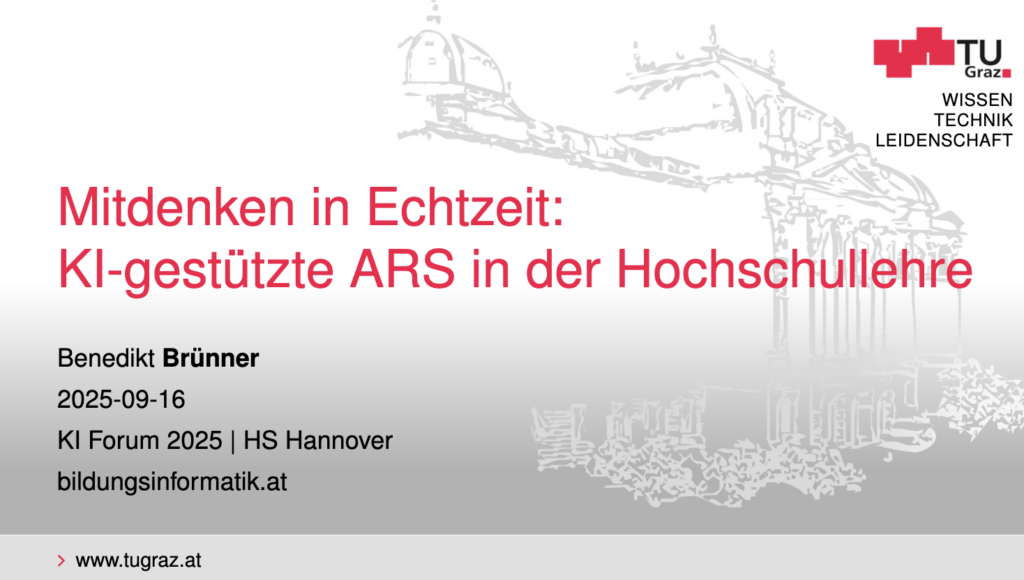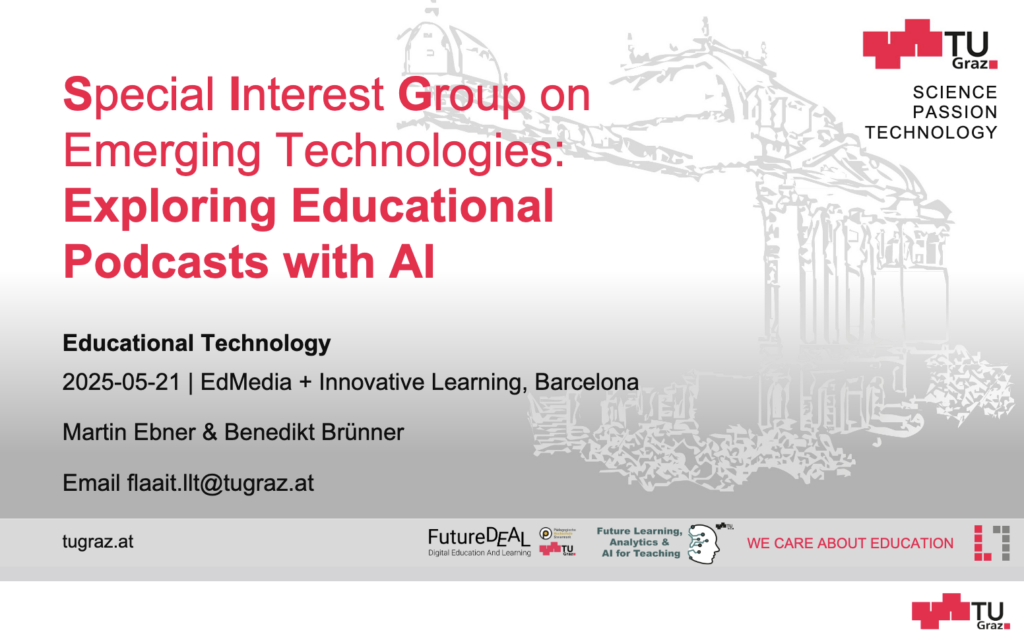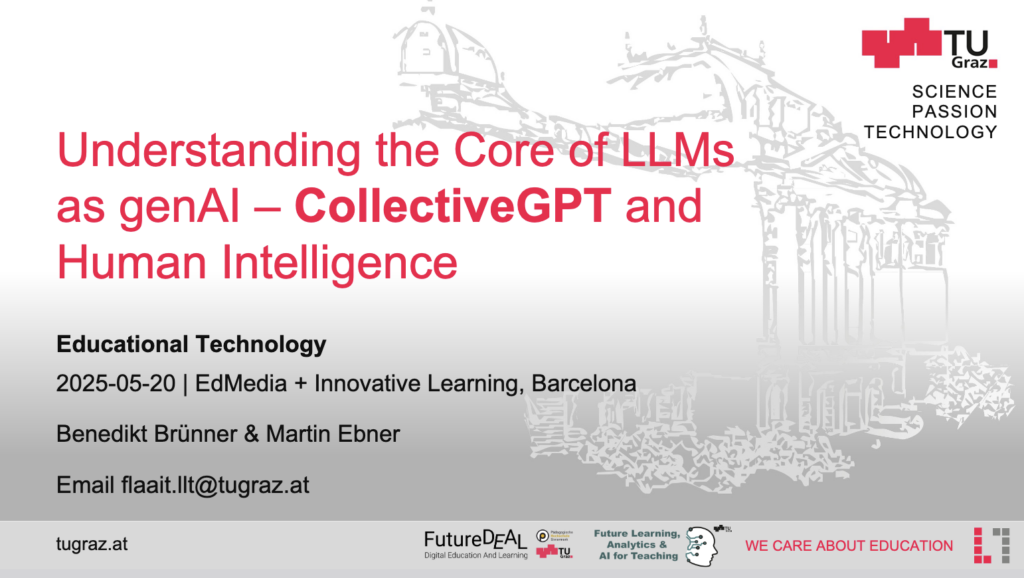Im Rahmen der Veranstaltung „Curricula entwickeln mit KI und anderen Tools“ von e-Teaching.org durfte ich einen Workshop zu „MOOCs im Curriculum und das vielleicht auch noch KI-gestützt?“ gestalten. Hier gibt es noch meine Folien nachgereicht:


Digitale Lehre an und rund um der Technischen Universität Graz
Im Rahmen der Veranstaltung „Curricula entwickeln mit KI und anderen Tools“ von e-Teaching.org durfte ich einen Workshop zu „MOOCs im Curriculum und das vielleicht auch noch KI-gestützt?“ gestalten. Hier gibt es noch meine Folien nachgereicht:

Im Rahmen des KI-Forums in Hannover hat Benedikt einen Workshop zu „Mitdenken in Echtzeit: KI-gestützte ARS in der Hochschullehre“ gehalten:
Welche Chancen bietet Künstliche Intelligenz, um Hochschullehre interaktiver zu gestalten und individuelles Feedback zu fördern? In diesem Workshop erleben die Teilnehmenden den Einsatz von KI-basierten Audience Response Systemen (ARS) am Beispiel des Open-Source-Tools echoQuiz.eu. Sie erfahren, wie explorative Frageformate die aktive Teilnahme in synchronen Lehrveranstaltungen steigern und wie Lehrende durch KI in Echtzeit didaktisch unterstützt werden können. In diesem Workshop werden gemeinsam Fragen entwickelt, praktisch erprobt und didaktisch reflektiert.
Seine Folien sind hier zugänglich:

At this year’s ED-Media conference, we also did a workshop on „Understanding the Core of LLMs as genAI -CollectiveGPT and Human Intelligence„. Find a short published summary about it.
Abstract:
This workshop provides an engaging and interactive exploration of Large Language Models (LLMs), with a focus on how they operate at a foundational level. Using CollectiveGPT, an educational chatbot developed by the Ed-Tech Research Community Graz, participants gained firsthand experience understanding the principles behind generative AI (genAI) systems such as ChatGPT. Designed for educators of all disciplines, the workshop demystifies key LLM concepts such as probability-based word prediction, contextual understanding, and the role of training data. Attendees generated texts and compare their results with real-time outputs from ChatGPT, highlighting the differences between human reasoning and AI prediction. Key topics include prompting techniques, context framing, training bias, misinformation, and ethical considerations in AI use. Participants explored system prompt injection techniques and developed advanced prompting skills to optimize responses from AI systems. This workshop empowered educators with the knowledge to critically evaluate and responsibly use AI tools in their teaching. By fostering AI literacy, attendees got clear understanding of how LLMs work and how they can be leveraged to enhance learning experiences across diverse educational settings.
[publication @ conference website]
[draft @ ResearchGate]
Reference: Brünner, B. & Ebner, M. (2025). Understanding the Core of LLMs as genAI – CollectiveGPT and Human Intelligence. In T. Bastiaens (Ed.), Proceedings of EdMedia + Innovate Learning (pp. 153-154). Barcelona, Spain: Association for the Advancement of Computing in Education (AACE). Retrieved June 14, 2025 from https://www.learntechlib.org/primary/p/226329/.
We also did workshops at this year’s ED-Media conference. One of them was titled „Workshop for Special Interest Group Emerging Technologies for Learning and Teaching: Exploring Educational Podcasts with AI“ and followed the idea of open discussions.
Abstract:
How can educators unleash the power of AI without losing control over core educational strategies? In this workshop, we introduced aicast, an open-source platform for educational podcasts that combines the best of both worlds: AI-generated elements for personalization and flexibility, and fixed elements, with instructor-defined content to ensure pedagogical accuracy. This hybrid approach reduces the risks associated with AI-generated materials like hallucinations. Attendees experienced how the platform utilizes LLMs like ChatGPT for personalized content authoring and ElevenLabs for high-quality voice synthesis, enabling real-time creation of educational audio content. After a short demo and hands-on session, participants engaged in a guided discussion: What is the core of an educational podcast? Most importantly from the perspective of an instructional designer, how must an educational podcast be? This session was part of the Special Interest Group on Emerging Technologies for Learning and Teaching at the ED-Media 2025 conference.
[draft @ ResearchGate]
[full article @ conference website]
Reference: Ebner, M. & Brünner, B. (2025). Workshop for Special Interest Group Emerging Technologies for Learning and Teaching: Exploring Educational Podcasts with AI. In T. Bastiaens (Ed.), Proceedings of EdMedia + Innovate Learning (pp. 1375-1376). Barcelona, Spain: Association for the Advancement of Computing in Education (AACE). Retrieved June 4, 2025 from https://www.learntechlib.org/primary/p/226347/.
For many years, we have also been organising an annual workshop as part of the ED-Media conference, known as the ‘Special Interest Group on Emerging Technologies’. The aim is always to show and discuss a new innovative technology for education. This year it was our newly developed AI Cast.
Here are the slides:

Ebner, M. & Brünner, B. (2025) Special Interest Group on Emerging Technologies: Exploring Educational Podcasts with AI. ED-Media conference 2025, Barcelona [slides]
It is ED-Media week again, and we had a lot of work: Workshops, presentations, and discussions. Our first activity is a workshop about „Understanding the Core of LLMs as genAI – CollectiveGPT and Human Intelligence„. Find our slides here:

Brünner, B., & Ebner, M. (2025, Mai 20). Presentation: Understanding the Core of LLMs as genAI – CollectiveGPT and Human Intelligence. Graz University of Technology. https://doi.org/10.3217/mznsf-g2047
We are delighted that we can offer another workshop for our „SIG“ at this year’s EDMedia conference in Barcelona titled „Exploring Educational Podcasts with AI„
Abstract:
How can educators unleash the power of AI without losing control over core educational strategies? In this workshop, we will introduce aicast, an open source platform for educational podcasts that combines the best of both worlds: AI-generated elements for personalization and flexibility, and fixed elements, with instructor-defined content to ensure pedagogical accuracy. This hybrid approach reduces the risks associated with AI-generated materials like hallucinations. Attendees will learn how the platform utilizes LLMs like ChatGPT for personalized content authoring and ElevenLabs for high-quality voice synthesis, enabling real-time creation of educational audio content. After a short demo and hands-on session, participants will engage in a guided discussion: What is the core of an educational podcast? How do structure, tone, and repetition affect learning? Most importantly from the perspective of an instructional designer, how must an educational podcast be? This session is part of the Special Interest Group on Emerging Technologies for Learning and Teaching and invites participants to think critically about the role of AI in educational podcasting. Even more we invite instructional designer to collaborate with us to bring educational podcast to a next level.
We would love to meet you in Barcelona, even more, if you can join our workshop – cu there 🙂
Congratulations to Benedikt, who did a great job developing a successful workshop for school teachers. We summarized his results in the publication „From Gretel to Strudelcity: Empowering Teachers Regarding Generative AI for Enhanced AI Literacy with CollectiveGPT.“
Abstract:
In the era of transformative technologies, generative artificial intelligence (genAI) offers profound opportunities and challenges for education. This study explores the development and execution of an interactive workshop designed to equip educators with foundational genAI literacy. Using a design-based research (DBR) framework, the workshop leverages interactivity and contextual relevance to introduce genAI concepts, prompting strategies and ethical considerations. Participants engaged in a scripted learning workshop design, comparing human and AI responses, exploring genAI’s probabilistic foundations, context dependency, and vulnerability to manipulation. Conducted across 12 workshops with 191 participants in Austria, this study revealed significant improvements in self-perceived genAI understanding, with 70% of participants reporting better grades in post-assessment evaluations. Feedback emphasized the workshop’s strengths in interactivity and relevance, alongside recommendations for deeper school-specific applications. Scalability analysis showed that workshop duration remained consistent regardless of group size, suggesting potential for broader implementation. The findings highlight the effectiveness of scripted learning workshop design in fostering critical AI literacy, preparing educators to critically evaluate and ethically integrate genAI into pedagogical practices. This adaptable model contributes to the discourse on professional development in AI-enhanced education.
[full paper @ publisher’s Homepage]
[full paper @ ResearchGate]
Reference: Brünner, B., Schön, S., & Ebner, M. (2025). From Gretel to Strudelcity: Empowering Teachers Regarding Generative AI for Enhanced AI Literacy with CollectiveGPT. Education Sciences, 15(2), 206. https://doi.org/10.3390/educsci15020206
Benedikt hat einen sehr netten Workshop erstellt um anschaulich die Funktionsweise einer generativen KI zu erklären:
In der Fortbildung Digitale Tools im Unterricht wurde unser kollektiver Chatbot ed-tech.app eingesetzt, hier finden Sie die Fragen und Antworten von ChatGPT 4o-mini zur Nachlese. Dabei wurde von den Teilnehmenden zuerst der Satz vervollständigt, und im Hintergrund ChatGPT 4o-mini parallel angefragt. Sie können die Antworten von ChatGPT hier im Blogeintrag nachlesen.
Sein Workshop ist auf unsere Bildungsinformatik.at Seite zum Nachlesen frei verfügbar – viel Spaß damit 🙂
We did a workshop at this year’s ED-Media Conference about „Experiences with Artificial Intelligence in the Classroom„
Abstract:
This year’s SIG meeting will focus intensively on the topic of „Experiences with Artificial Intelligence in the classroom“. AI changes education maybe radically and had hopefully a positive impact on education. Therefore, we ask for short presentations and inputs to discuss our practical experiences with AI use in education amongst all participants. Everyone is cordially invited to come and share their challenges, their impact, their worries or success stories or to get to know the latest findings and tools.
[article @ publisher’s homepage]
[article @ ResearchGate]
Reference: Ebner, M. & Brünner, B. (2024). Experiences with Artificial Intelligence in the Classroom. In T. Bastiaens (Ed.), Proceedings of EdMedia + Innovate Learning (pp. 1180-1181). Brussels, Belgium: Association for the Advancement of Computing in Education (AACE). Retrieved July 22, 2024 from https://www.learntechlib.org/primary/p/224665/.